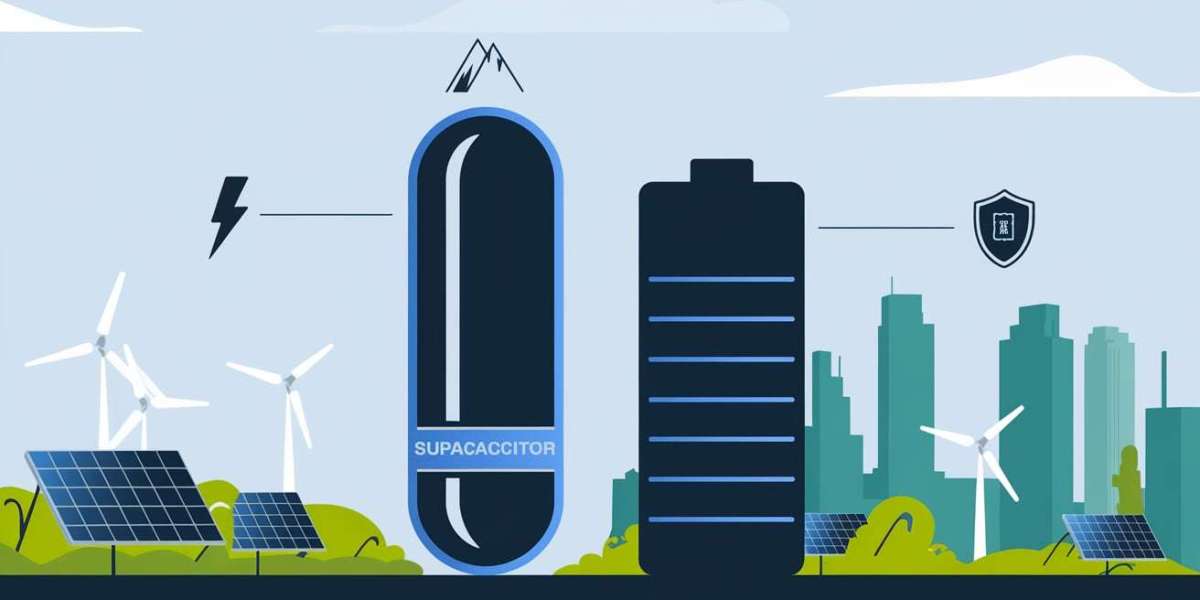In today’s fast-paced world, energy storage technology is evolving rapidly, offering new solutions to meet the demands of modern life. Among the most innovative are capacitor batteries, which blend the fast-charging capabilities of capacitors with the energy density of batteries. But how do they compare to traditional batteries? This article dives into the strengths and limitations of capacitor batteries, highlights their potential applications, and examines the "battery versus capacitor" debate to help you understand how these technologies fit into the energy landscape.
What Are Capacitor Batteries?
Capacitor batteries combine the benefits of capacitors and batteries into a single energy storage solution. Capacitors are known for their ability to charge and discharge energy rapidly, while batteries excel at storing larger amounts of energy over longer periods. Capacitor batteries integrate these capabilities, offering a hybrid approach to energy storage.
Key Features of Capacitor Batteries
- Rapid Charging: Capacitor batteries can charge in seconds or minutes, making them ideal for applications where downtime is a concern.
- High Power Output: They deliver bursts of energy efficiently, perfect for devices that require short, high-power performance.
- Longevity: Capacitor batteries typically last longer than traditional batteries due to their reduced wear and tear over charge cycles.
Battery Versus Capacitor: How They Differ
Although batteries and capacitors both store energy, their underlying technologies and applications are fundamentally different.
1. Energy Density
- Battery: Offers a high energy density, meaning it can store large amounts of energy and power devices for extended periods.
- Capacitor: Has a lower energy density, making it better suited for applications requiring short bursts of energy.
2. Charging Time
- Battery: Requires hours to charge fully, depending on its chemistry and capacity.
- Capacitor: Charges almost instantaneously, making it highly efficient for quick use.
3. Lifespan
- Battery: Has a limited number of charge cycles before its capacity begins to degrade.
- Capacitor: Can endure millions of charge cycles without significant performance loss.
4. Applications
- Battery: Best for long-term energy storage, such as powering smartphones, electric vehicles, and home energy systems.
- Capacitor: Ideal for applications requiring rapid energy delivery, such as regenerative braking systems or memory backup in electronics.
Applications of Capacitor Batteries
Capacitor batteries are gaining traction in various industries due to their unique advantages. Below are some notable use cases:
1. Automotive Industry
- Electric Vehicles (EVs): Capacitor batteries can complement traditional lithium-ion batteries in EVs by providing rapid energy boosts during acceleration or regenerative braking.
- Hybrid Vehicles: Their fast-charging capability makes them ideal for storing and reusing energy generated during braking.
2. Renewable Energy Systems
- Capacitor batteries can stabilize fluctuations in renewable energy systems, such as wind and solar power, by providing instant energy delivery when production dips.
3. Consumer Electronics
- Used in memory backup systems, where they provide short-term power to preserve data during power outages or device shutdowns.
4. Industrial Applications
- Capacitor batteries are employed in machinery that requires rapid bursts of energy, such as cranes, drills, and conveyor belts.
Advantages of Capacitor Batteries
Capacitor batteries offer several advantages over traditional energy storage solutions, making them a promising option for the future:
1. Faster Charging
Their rapid charging capabilities significantly reduce downtime, which is critical for industries and applications where time is money.
2. Longer Lifespan
Unlike traditional batteries that degrade over time, capacitor batteries maintain their performance over millions of charge cycles, reducing replacement costs.
3. Environmentally Friendly
Since they have a longer lifespan and require fewer replacements, capacitor batteries generate less electronic waste compared to traditional batteries.
4. Safety
Capacitor batteries are less prone to overheating or thermal runaway, a safety concern associated with some battery chemistries.
Challenges of Capacitor Batteries
While capacitor batteries have clear advantages, they are not without challenges:
1. Lower Energy Density
Compared to traditional batteries, capacitor batteries store less energy, making them unsuitable for applications requiring prolonged energy supply.
2. Higher Initial Costs
The technology is still relatively new and may involve higher upfront costs compared to traditional energy storage solutions.
3. Limited Availability
Capacitor batteries are not yet widely adopted, which can limit their accessibility for certain applications.
Battery Versus Capacitor: Finding the Right Fit
Choosing between batteries and capacitors depends on your specific needs. Here are some factors to consider:
- Energy Needs: If your application requires long-term energy storage, traditional batteries are the better option. For rapid energy delivery, capacitors or capacitor batteries are ideal.
- Budget: Capacitors may involve higher initial investment costs but offer long-term savings due to their durability.
- Sustainability Goals: Capacitor batteries align with environmentally conscious practices due to their extended lifespan and reduced waste.
Future Trends in Capacitor Battery Technology
As technology advances, the potential of capacitor batteries is expanding. Researchers are working on improving their energy density to rival that of traditional batteries. One promising development is the use of graphene in capacitor batteries, which significantly enhances their energy storage capabilities.
Additionally, the integration of artificial intelligence in energy systems could optimize the use of capacitor batteries, ensuring efficient energy management in smart grids and renewable energy systems.
How Cura4u Can Help with Sustainable Energy Solutions
At Cura4u, we’re committed to providing solutions that align with modern energy needs. Whether you're exploring capacitor batteries for renewable energy systems or need insights into optimizing your energy storage solutions, we offer expert guidance to help you make informed decisions.
Final Discussion: A Future Powered by Capacitor Batteries
Capacitor batteries represent a significant step forward in energy storage technology, offering rapid charging, durability, and safety. While they may not yet replace traditional batteries entirely, their unique features make them indispensable in various industries and applications.
Whether you're considering capacitor batteries for your electric vehicle or looking to stabilize your renewable energy system, understanding their benefits and limitations is crucial. Explore this innovative technology today and embrace the future of efficient energy storage.
For more insights into energy solutions, visit Zoxcellor contact our team for expert advice!



